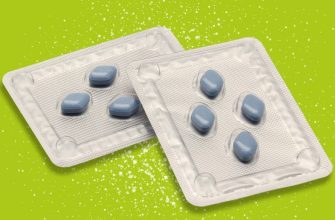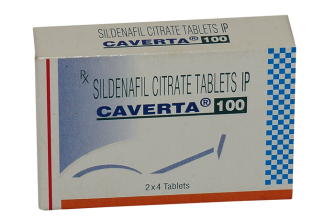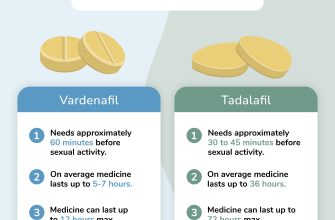If you have received a prescription for Viagra (sildenafil citrate), it’s crucial to understand how to use it effectively for treating erectile dysfunction. Start by taking the medication approximately 30 to 60 minutes before engaging in sexual activity. This timeframe allows the drug to begin working, enhancing blood flow to the penis during sexual stimulation.
Follow your healthcare provider’s dosage instructions carefully. The typical starting dose is 50 mg, but it can be adjusted based on your individual response and tolerability. Do not exceed one dose per day, and always inform your doctor about any other medications or health conditions, as certain drugs and diseases may interact adversely with sildenafil.
While Viagra can significantly improve sexual performance, be aware of potential side effects. Common reactions include headaches, flushing, and digestive issues. Rarely, users might experience severe side effects like sudden vision or hearing loss; if this occurs, seek medical attention immediately. Keep an eye on your overall health, and consult your healthcare provider regularly to monitor your condition and the medication’s impact.
- Viagra Sildenafil Citrate Patient Information Prescription
- Dosage Guidelines
- Side Effects and Precautions
- Understanding Sildenafil Citrate: What You Need to Know
- Dosage and Administration
- Possible Side Effects
- Indications for Viagra: Who Should Consider This Medication
- Dosage Guidelines for Sildenafil: How to Use Viagra Effectively
- Potential Side Effects of Viagra You Should Be Aware Of
- Drug Interactions: What to Avoid While Taking Sildenafil
- Common Nitrate Medications
- Other Drug Interactions
- How to Obtain a Prescription for Viagra: The Process Explained
- Storage and Handling of Viagra: Best Practices for Safety
- Disposal Guidelines
- Handling Precautions
Viagra Sildenafil Citrate Patient Information Prescription
Before using Viagra (sildenafil citrate), carefully read the medication guide provided with the prescription. This information explains how to use the medication safely and effectively.
Dosage Guidelines
Follow the prescribed dosage by your healthcare provider. Typically, sildenafil is taken as needed, approximately 30 minutes to 1 hour before sexual activity. Do not exceed one dose within 24 hours.
Side Effects and Precautions
Possible side effects include headaches, flushing, nasal congestion, and upset stomach. If you experience severe side effects, such as chest pain or an erection lasting more than 4 hours, seek medical help immediately.
| Possible Side Effects | Action to Take |
|---|---|
| Headache | Use over-the-counter pain relievers if needed. |
| Flushing | Stay hydrated and avoid alcohol. |
| Nasal congestion | Consider using a saline nasal spray. |
| Chest pain | Seek emergency medical attention. |
| Prolonged erection | Contact a doctor immediately. |
Inform your doctor of any pre-existing conditions, especially heart problems, and mention any medications you are taking to avoid potential interactions. Avoid sildenafil if you use nitrates or other blood pressure medications.
Understanding Sildenafil Citrate: What You Need to Know
Sildenafil citrate, commonly known as Viagra, is primarily used to treat erectile dysfunction (ED). It works by increasing blood flow to the penis during sexual stimulation, facilitating an erection. Take the medication approximately 30 minutes to an hour before planned sexual activity for optimal results. It’s essential to note that sexual stimulation is necessary for sildenafil to be effective.
Dosage and Administration
The typical starting dose for sildenafil is 50 mg. Your healthcare provider may adjust this based on your response and tolerability. It’s crucial not to exceed the maximum recommended dose of 100 mg in a 24-hour period. Swallow the tablet whole with water; avoiding high-fat meals can enhance absorption.
Possible Side Effects
Some users may experience side effects, including headaches, flushing, upset stomach, or nasal congestion. Most side effects are mild and temporary. Serious side effects, like vision changes or prolonged erections (lasting more than four hours), require immediate medical attention. Discuss any pre-existing health conditions or medications with your healthcare provider to ensure safe use.
Indications for Viagra: Who Should Consider This Medication
Viagra, containing sildenafil citrate, is primarily indicated for men experiencing erectile dysfunction (ED). If you struggle to achieve or maintain an erection sufficient for sexual activity, this medication may be a suitable option.
Individuals who have a history of erectile difficulties due to psychological factors, including anxiety or depression, can benefit from Viagra. The medication works by relaxing blood vessels in the penis, thus enhancing blood flow during sexual arousal.
Men with certain medical conditions, such as diabetes or hypertension, often encounter ED as a complication. For these patients, Viagra can help restore their sexual function, improving overall quality of life.
Age can also influence erectile function; older adults may find Viagra beneficial as natural testosterone levels decline with age. Consulting a healthcare provider will ensure it’s appropriate for your specific health situation.
Before considering Viagra, it’s important to discuss your medical history and any ongoing treatments with your doctor. This conversation will help ascertain that Viagra is safe and effective for you, considering any contraindications.
If you experience a prolonged erection lasting over four hours, seek immediate medical attention. This rare but serious side effect requires prompt intervention.
Dosage Guidelines for Sildenafil: How to Use Viagra Effectively
Take sildenafil as prescribed by your healthcare provider. The usual starting dose for most men is 50 mg, taken approximately 1 hour before sexual activity. However, you can take it anywhere from 30 minutes to 4 hours before engaging in sexual intercourse.
If the initial dose does not produce the desired result, consult your doctor about increasing the dosage. Maximum recommended dose for most is 100 mg, while some may benefit from a reduction to 25 mg based on individual tolerance and response.
Avoid taking sildenafil with a high-fat meal, as it may delay the onset of action. For dosing frequency, do not exceed once per day.
If you experience side effects or interactions with other medications, contact your healthcare provider immediately. Maintaining an open dialogue will allow adjustments to the dosage or switching to an alternate treatment, if necessary.
Always follow your doctor’s instructions and discuss any specific concerns or health conditions that may influence your sildenafil use. This ensures a safe and tailored approach to managing erectile dysfunction.
Potential Side Effects of Viagra You Should Be Aware Of
Be informed that Viagra can cause side effects. Common reactions include headaches, flushing, and indigestion. Pay attention to these symptoms, as they often resolve with time.
More serious effects occur in some patients. These may include vision changes, such as increased sensitivity to light or blurred vision. If you notice sudden changes in vision, contact your doctor immediately.
Rarely, Viagra can lead to priapism, a prolonged and painful erection lasting more than four hours. This condition requires urgent medical attention to avoid permanent damage. Do not hesitate to seek help if this happens.
Other potential side effects involve hearing loss. Some individuals report sudden decrease or loss of hearing while using the medication. If you experience this, consult your healthcare provider without delay.
Check for interactions with other medications. Nitrates, often prescribed for chest pain, can cause dangerous drops in blood pressure when combined with Viagra. Always inform your doctor about all medications you are taking.
Your health history matters. If you have heart problems, low blood pressure, or a history of stroke, discuss these conditions with your healthcare provider prior to starting treatment.
Staying informed about these side effects allows you to monitor your health effectively while using Viagra. Regular follow-ups with your doctor ensure safe and effective treatment tailored to your needs.
Drug Interactions: What to Avoid While Taking Sildenafil
Avoid taking sildenafil with nitrates, as this combination can lead to a significant drop in blood pressure, potentially causing dizziness and fainting.
Common Nitrate Medications
- Isosorbide dinitrate
- Isosorbide mononitrate
- Nitroglycerin (including patches and sprays)
If you’re using these medications for heart conditions, discuss alternative treatment options with your healthcare provider.
Other Drug Interactions
Be cautious with the following substances:
- Alpha blockers: Combining sildenafil with medications like doxazosin or terazosin can enhance blood pressure lowering effects.
- CYP3A4 inhibitors: Drugs that affect this enzyme, such as ketoconazole, erythromycin, or certain antidepressants, may increase sildenafil’s effects, requiring dosage adjustments.
- Antihypertensive medications: If you’re on blood pressure medication, monitor your symptoms closely, as sildenafil can further lower blood pressure.
Consult your healthcare provider before initiating or discontinuing any medication, ensuring a safe treatment plan while using sildenafil.
How to Obtain a Prescription for Viagra: The Process Explained
To get a prescription for Viagra (sildenafil citrate), follow these clear steps:
-
Schedule a Consultation:
Book an appointment with your healthcare provider. This can be your regular doctor or a specialist in sexual health.
-
Discuss Symptoms:
During the visit, openly discuss any erectile dysfunction issues. Describe your symptoms, their frequency, and how they affect your life.
-
Medical Evaluation:
Your doctor will likely conduct a physical examination and may request blood tests to assess overall health. This step ensures Viagra is safe for you.
-
Review Medical History:
Be prepared to share your complete medical history, including any existing health conditions and medications you take. Certain conditions may affect your eligibility for Viagra.
-
Prescription Issuance:
If appropriate, your doctor will write you a prescription. Understand the dosage and how to take the medication before leaving the office.
-
Choose a Pharmacy:
Take your prescription to a pharmacy of your choice. You can opt for a local pharmacy or an online service that verifies the prescription.
-
Follow-Up:
Schedule a follow-up appointment to discuss the medication’s effectiveness and any side effects you may experience. Adjustments can be made as needed.
Adhere to these steps for a smooth process in obtaining Viagra. Always consult your doctor to ensure safe usage tailored to your health needs.
Storage and Handling of Viagra: Best Practices for Safety
Store Viagra at room temperature, ideally between 68°F to 77°F (20°C to 25°C). Avoid exposure to extreme heat, moisture, and light to maintain its effectiveness. Always keep the medication in its original packaging until use to protect from external factors.
Disposal Guidelines
When disposing of Viagra, follow local regulations. Do not flush down the toilet or pour it down the drain unless specifically instructed. Safely throw away unused or expired medication in household trash by mixing it with an undesirable substance, like used coffee grounds or kitty litter, and sealing it in a container.
Handling Precautions
Wash your hands before handling the pills. Avoid contact with water or liquids. If any tablets are damaged or appear discolored, do not use them. Ensure to keep Viagra out of reach of children and pets to prevent accidental ingestion. Regularly check the expiry date and consult your pharmacist for questions about storage and handling.










